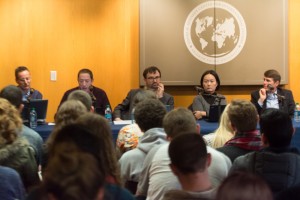
(Natalie Bothwell)
Four scholars from around the world gathered at the David M. Kennedy Center on Monday, Jan. 11, 2016 to hold a discussion panel on how the global political engagement has changed over the past few decades. Each speaker emphasized the transition in global economic power, more specifically the rise of the BRICS (Brazil, Russia, India, China and South Africa) countries.
The team consisted of Tobias Hofmann, from the University of Utah, Yoram Haftel, from the Hebrew University of Jerusalem, Andreas Fuch, from Heidelberg University and Soo Yeon Kim, from the National University of Singapore. BYU’s political science professor and associate chair, Daniel Nielson started the panel by presenting each scholar and their area of expertise related to economic governance.
“Countries like China, 10 to 15 years ago weren’t even part of the world trade organization, so not only are they more prominent in terms of being now the largest exporter, having more economic weight that they can bring to the table, it is the first time they actually show up at the table,” Hofmann said.
Haftel explained that BRICS involvement with other countries as donors or providing aid isn’t necessarily a new practice, but that the attention they are receiving has only begun more recently.
“Will they rewrite the rules of global government? Will they have the initiative to change the architecture? Definitely yes,” Haftel said.
Kim discussed the transition in global governmental involvement through the “regionalism” perspective. She also said the rising powers of BRICS has changed regionalism in two distinct ways: continuation and creation. She said the global economics has seen a continuation of increase in influence and at the same time set up of new institutions from BRICS.
All scholars agreed the countries that make up BRICS are all powerful for different reasons.
Hofmann said they share a common goal to expand and act as a powerful nations to other nations they assist and support even though they are competitors.
“It’s not foreseeable in which way they would potentially agree to change the way the international trade regime is run from today because they probably couldn’t agree on anything,” Hofmann said. “They also probably wouldn’t have much reason to change the way the international governments work today.”
Haftel emphasized the role China plays in the global economic governance compared to other countries around the world in BRIC. He said both Brazil and South Africa go against governmental regime while China is in favor of it.
He also said China has signed many treaties because of its position in the world economy. Haftel said the Chinese government is interested in protecting its investors and thus becomes involved with other countries, especially those in the west, making China one of the most economically involved country in the world.
Fuch discussed his area of expertise of how the global involvement is influenced by international development and providing involvement aid. He made a point that aid is usually provided and offered when human rights and democracy is brought up but that the BRIC countries believe in not being involved in such cases.
He also said certain BRICS countries believe that aid should benefit both sides and by 2020 will be more business oriented.
The scholars began to ask the students questions about their insight and experiences as returned missionaries and study abroad students who had traveled to other countries after their discussion. Several students participated adding insight and confirming the scholar’s theories.
Scholars and students agreed that perspectives of the most powerful nations in the global economy shifted and continues to change depending on the involvement of the BRICS countries.




